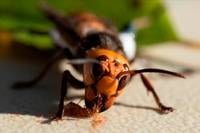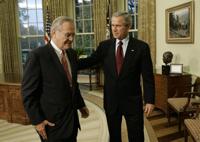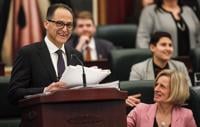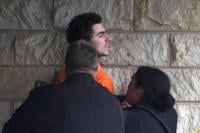Recent posts on social media have claimed that Ukraine has banned Christianity, or banned the Ukrainian Orthodox Church. This is false and misleading. Ukraine did not ban Christianity. As for the Ukrainian Orthodox Church, the country this month passed a law banning religious groups with ties to Russia, and that church is seen as the main target of the ban. However, final enforcement of the law can’t take effect for another nine months, meaning the Ukrainian Orthodox Church is not officially banned at this time.
On Aug. 20, a blue-check user on X, formerly Twitter, appearing to show Ukrainian lawmakers in parliament, some clapping, standing or filming.
The post reads, "BREAKING: Ukraine bans Christianity," and goes on to say Ukraine just adopted a law "banning the Ukrainian Orthodox Church."
As of Aug. 28, the post had received 1.4 million views.
The claim spread widely on X ( and ), Facebook ( and ) and Instagram ( and ).
Rating: False and misleading
Ukraine did not ban Christianity, nor has it banned the Ukrainian Orthodox Church, though it did pass a law that could lead to the church being banned in the near future.
On Aug. 20, Ukrainian lawmakers banned religious groups with ties to Russia, . The main target of the ban is the Ukrainian Orthodox Church (UOC), which has historically been tied to the Russian Orthodox Church (ROC), or the Moscow Patriarchate. The Russian Orthodox Church is now banned on Ukrainian territory, and a government commission is planned to make a list of organizations affiliated with the ROC that will also be banned, . The list is expected to target the UOC specifically.
gives the government authority to investigate religious groups it suspects of contravening the law, but final court enforcement of any action can’t take effect until nine months after the law was passed, .
The UOC and other religious groups have nine months to cut ties with Russia or risk being shut down by a court order, CNN reported. The law passed with 265 lawmakers voting for it and 29 voting against.
The bill calls the ROC “an ideological extension of the regime of the aggressor state” and “an accomplice to war crimes and crimes against humanity,” The Associated Press reported.
The UOC has been accused by the country’s leaders of abetting Russia’s war on Ukraine by spreading propaganda and housing spies, Reuters and other news outlets reported.
The UOC has historically been part of the ROC but started to distance itself after the February 2022 invasion, Reuters reported. However, Ukrainian officials have disputed this and have launched criminal proceedings against some UOC clerics.
Many Ukrainians still call the UOC the “Ukrainian Orthodox Church - Moscow Patriarchate,” The Associated Press reported.
The church has denied having any links with “foreign centers,” per Reuters.
The UOC is one of two main Orthodox Christian groups in the country. The other is the independent Orthodox Church of Ukraine (OCU), which has been by the world Orthodox hierarchy since 2019, Reuters reported.
Almost three-quarters of Ukrainians are Orthodox Christians, from the Kyiv International Institute of Sociology. Of those, 54 per cent identify specifically with the OCU, while only four per cent identify themselves with the UOC. The share of people identifying with the independent church has grown over time, going from 42 per cent to 54 per cent between 2021 and 2022. Meanwhile, the share of people identifying with the UOC declined from 18 per cent to four per cent.
Sources
The claim can be found on X (, ), () and (), on Facebook () and (), and on Instagram () and ()
()
��()
()
()
��()
()
()
About ��ɫֱ�� Press fact checks
You can find out more about ��ɫֱ��here and about ��ɫֱ�� Press Fact Checks here. To reach our fact-checking team with any tips, corrections or comments, please email us at cpfactcheck@thecanadianpress.com.






































